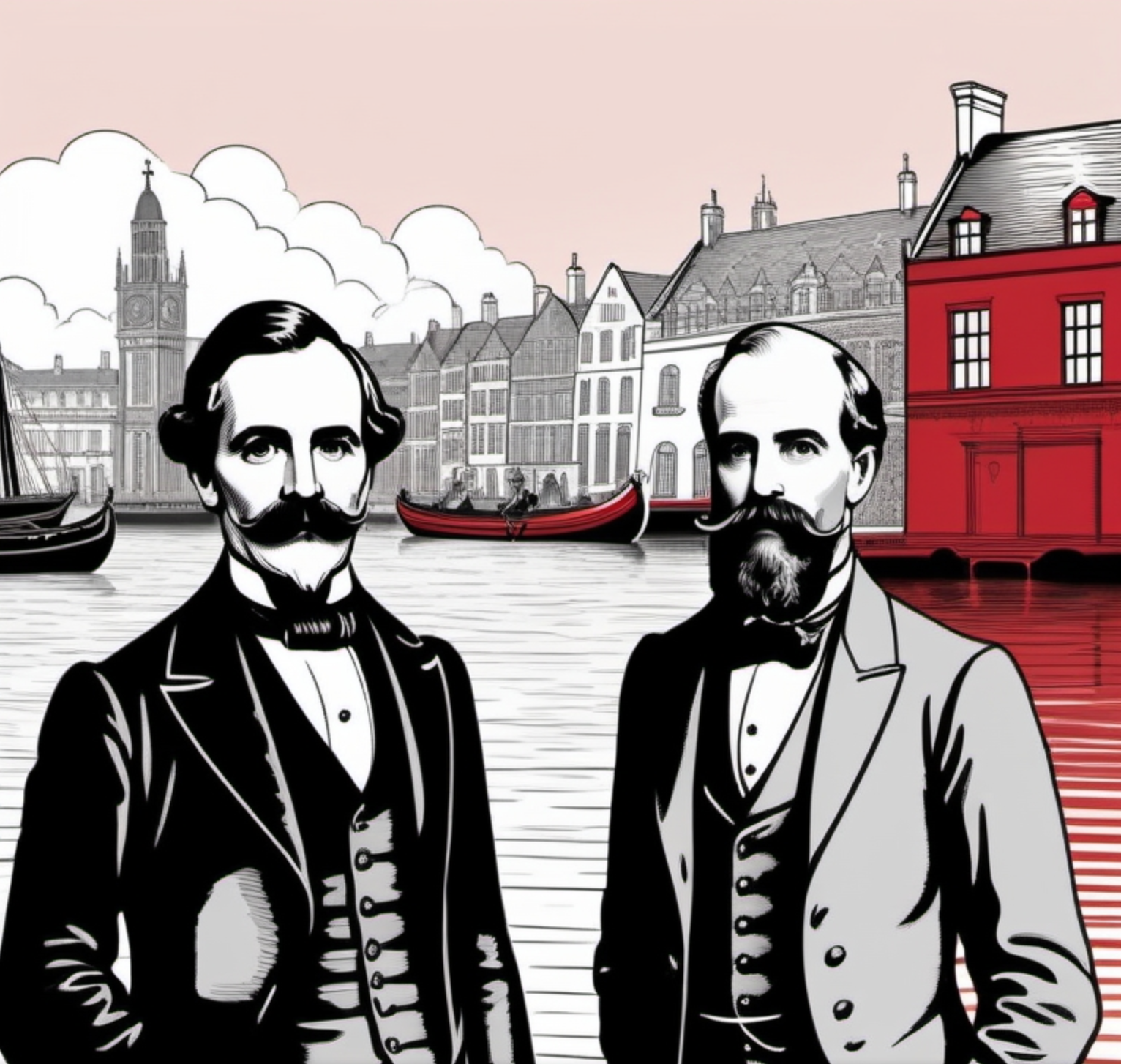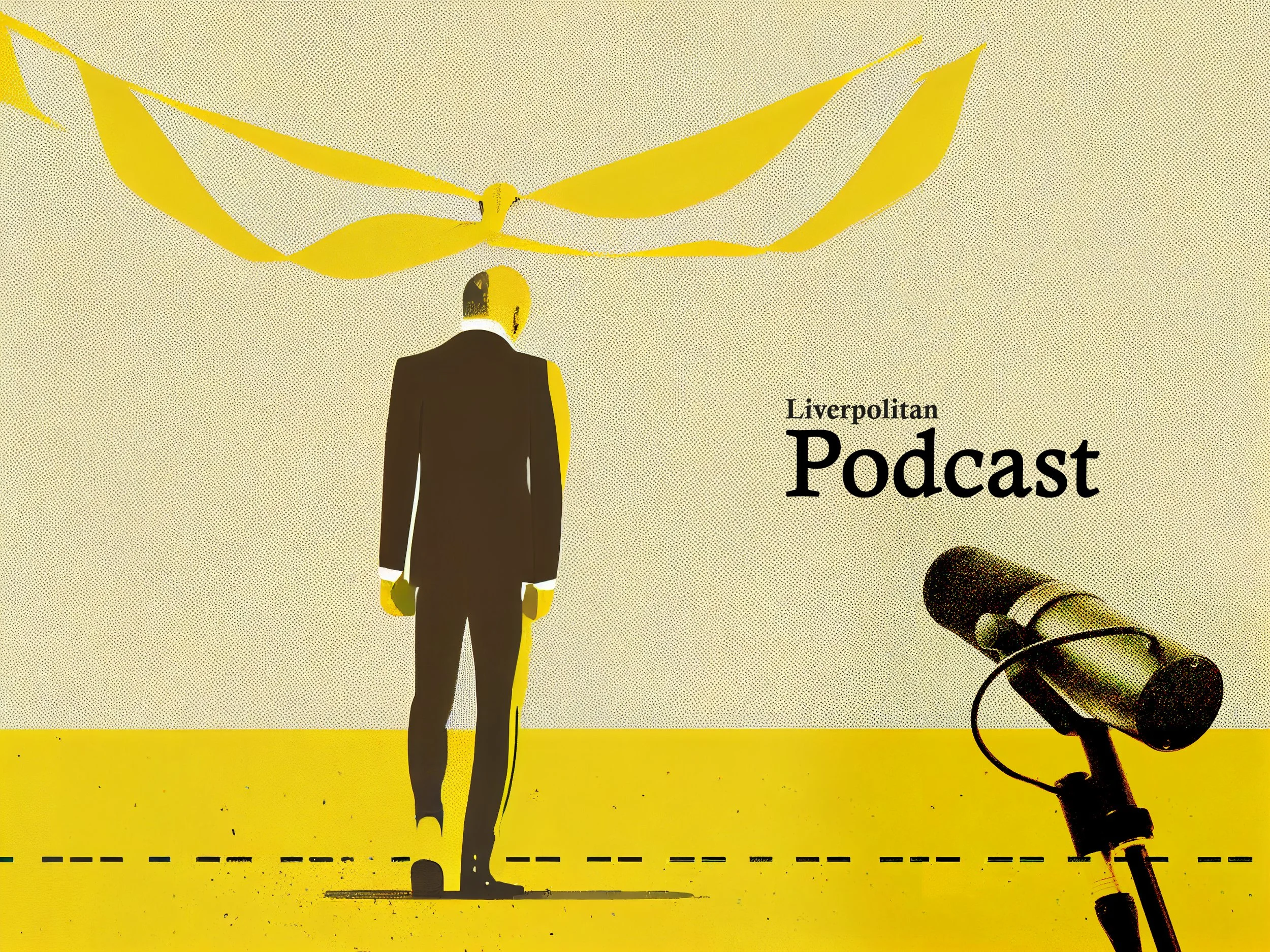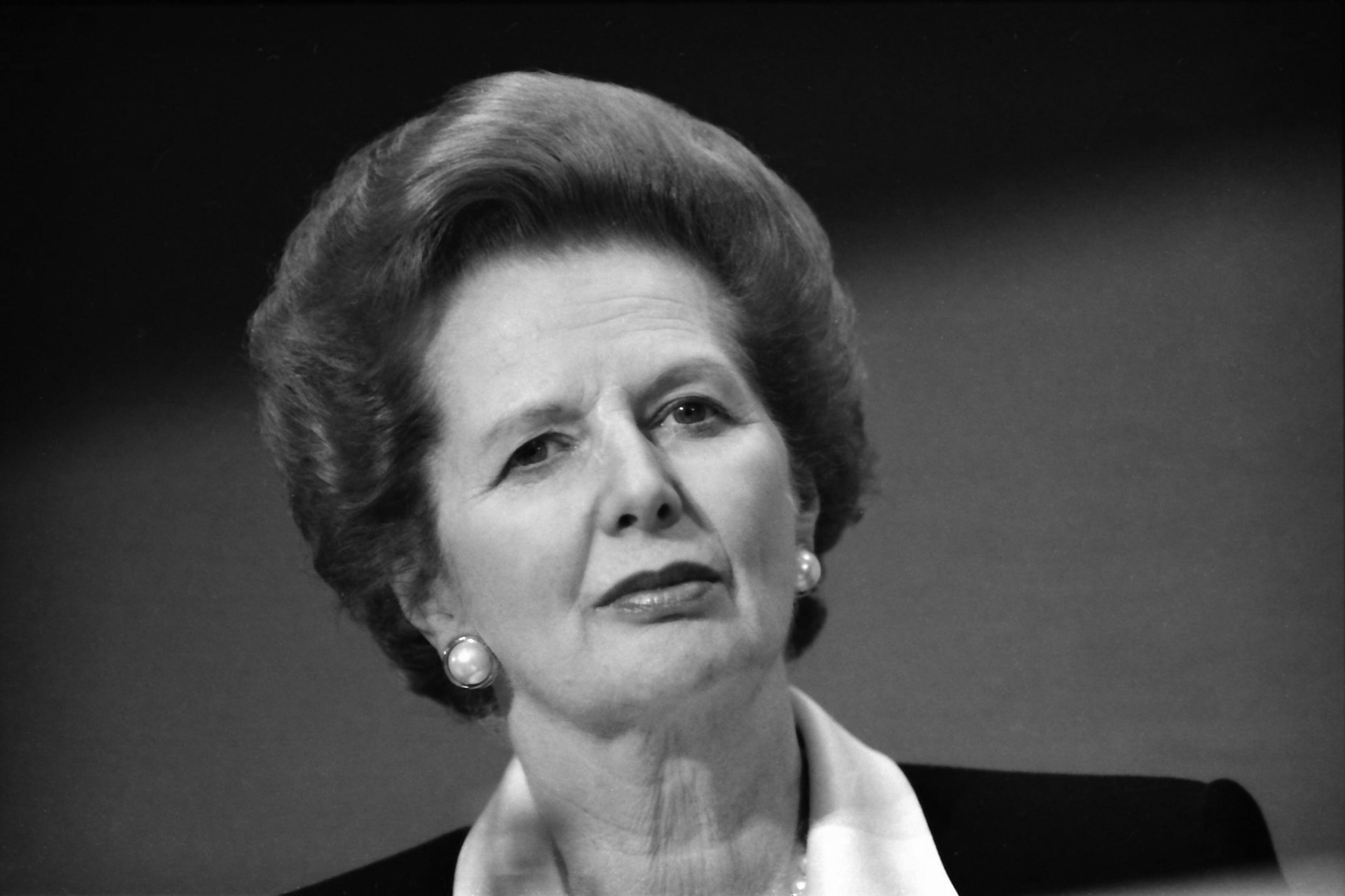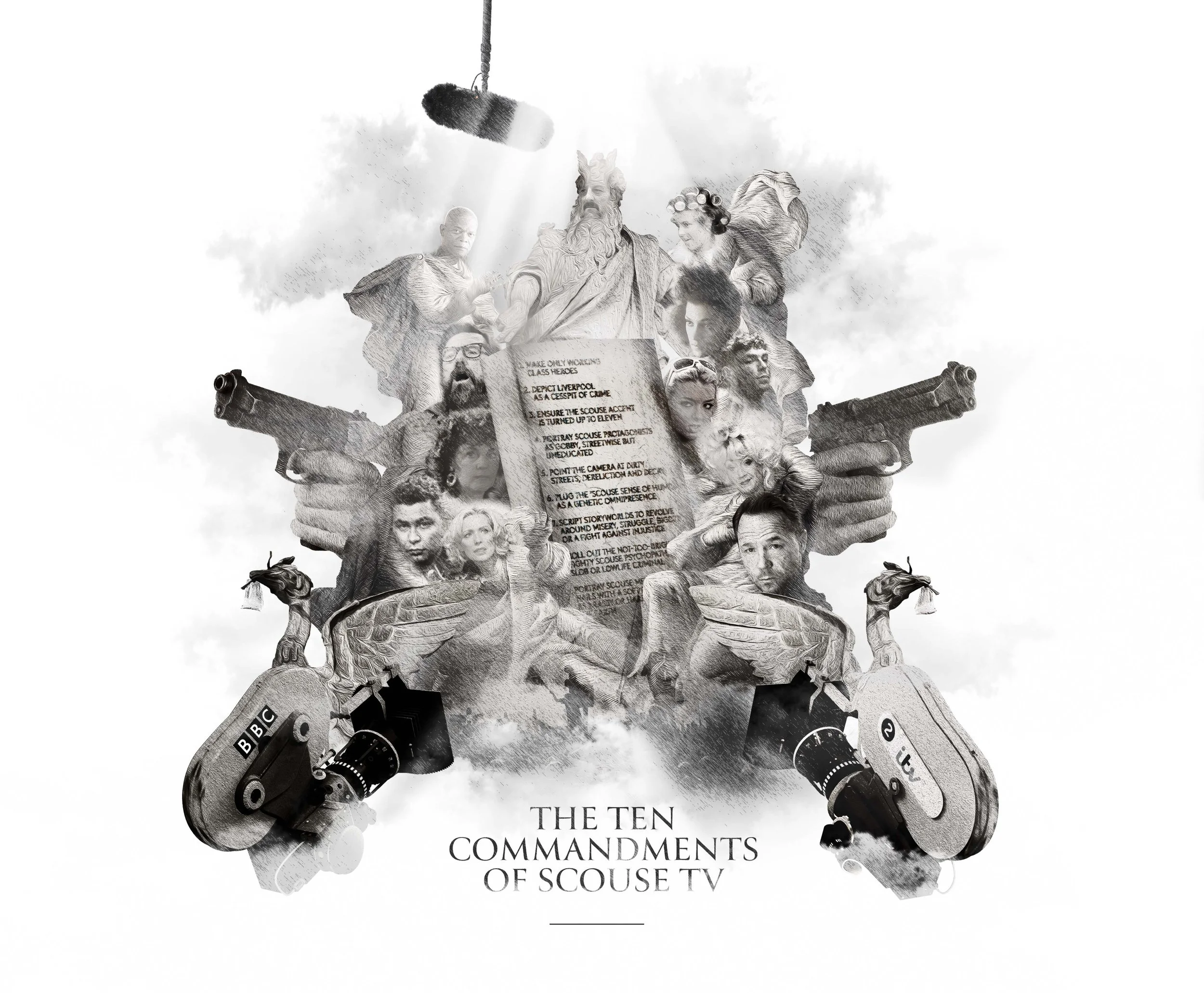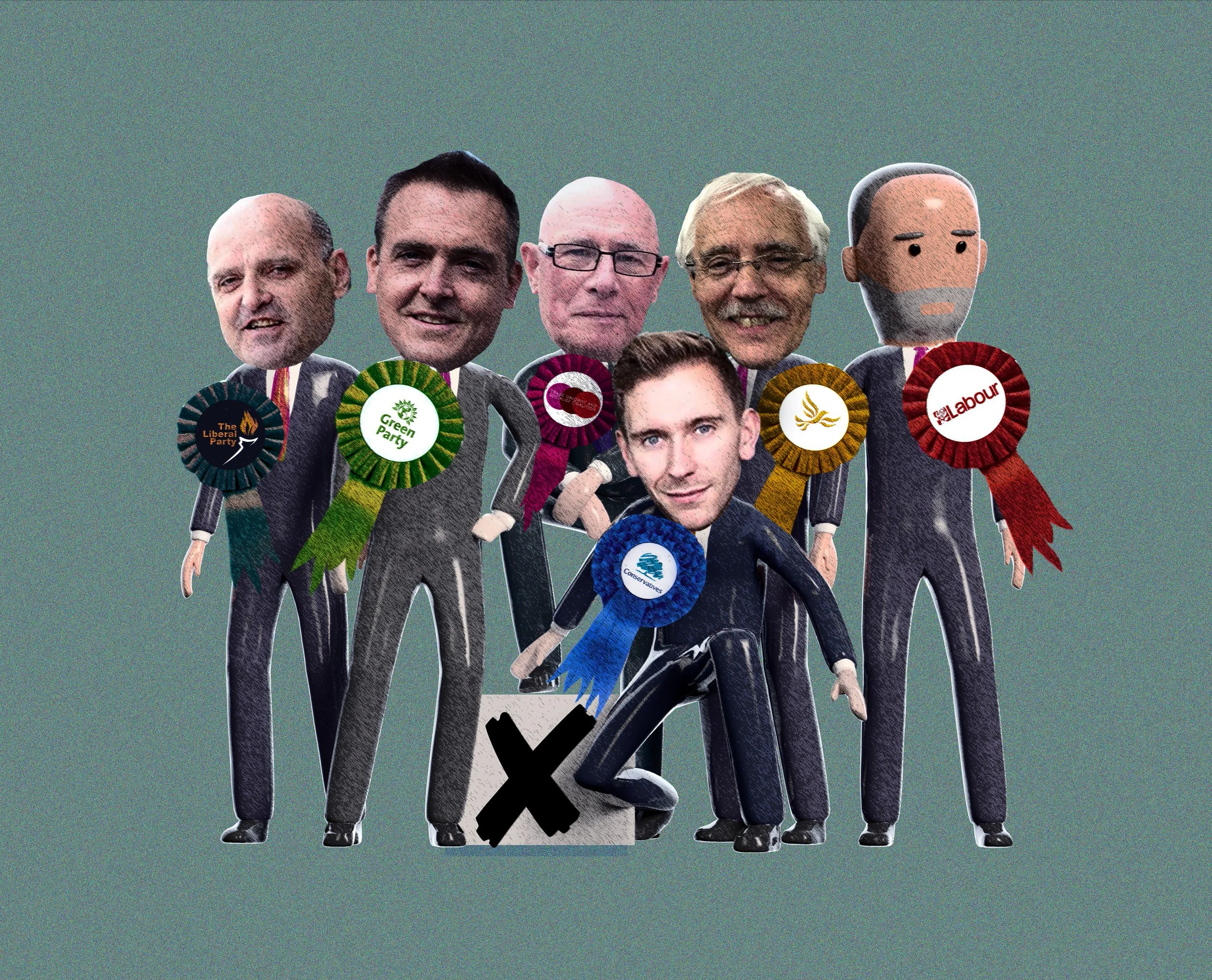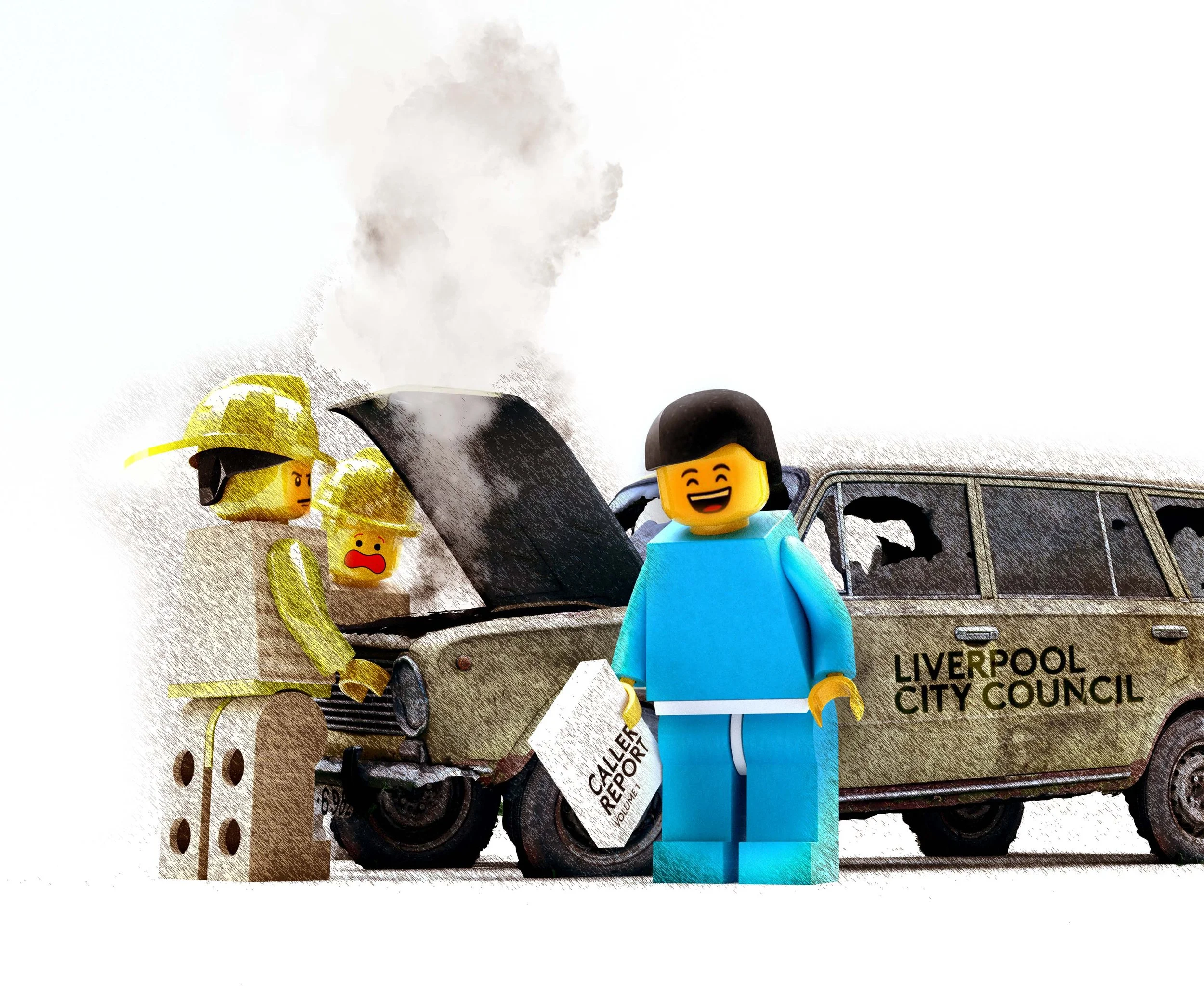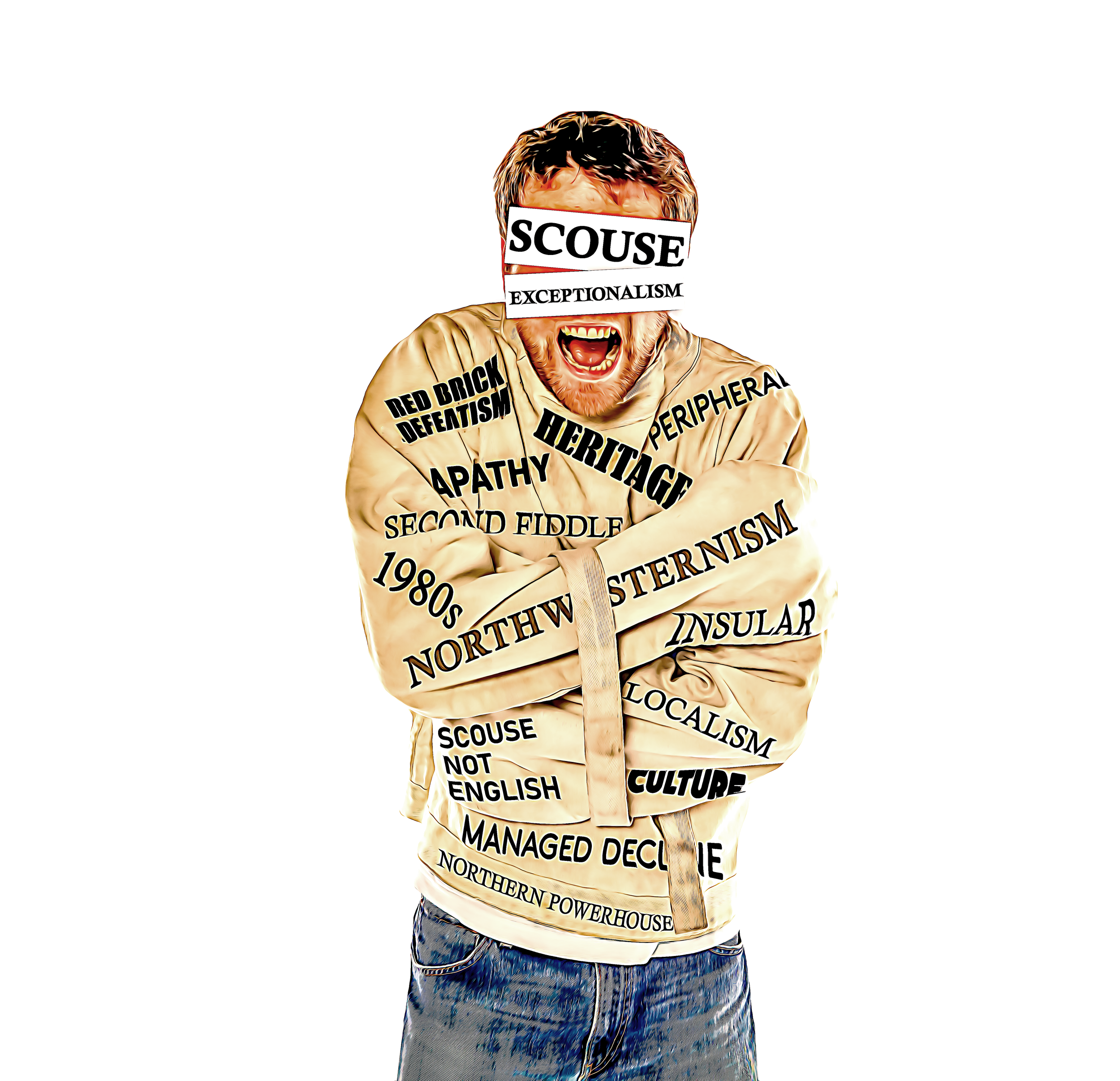Recent features
The tales we tell. Why Scouse stories of strength and resistance matter
Liverpool should never turn its back on a troubled past. On the contrary, as Patrick Devaney argues in this reply piece, it's not our suffering but our record of showing strength through adversity that defines us and the stories we tell about ourselves.
Patrick Devaney
In a recent op-ed entitled, Why we need to stop banging on about Thatcher and the Toxteth bloody riots, Liverpolitan Editor, Paul Bryan argued that focusing on the city’s past risks pinning Scousers as “irrelevant, backward-looking, and worst of all, passive in the face of the present” and can offer us only “a shrunken vision of our place in the world… a tiny Scouse Republic of Retreat.” I feel compelled to respond to this as I believe there is no need to look down on the hard times the city has been through or shy away from the broken images of urban decay that haunt our past. It is what it is, and we are who we are. There is no shame in who we are and highlighting the challenges we’ve faced in the past does not mark us with a “Petty Scouser” point of view.
Rather, for me, one of the key reasons we shouldn’t be turning our backs on the past is the fact that, unfortunately, the future increasingly now looks more like the past. It’s not like austerity ever really went away, but now, with austerity 2.0 biting up and down the country, we need the strength to pull together more than ever. Furthermore, there’s no reason to think that the outward-looking agency Paul craves cannot be found in the extreme challenges the city’s inhabitants have faced together. Communal adversity can spur social and political movements that change the world. However, there are limits to how far identity can take us and I intend to show in this response article that while our common heritage offers us strength in our identity, that very identity can only take us so far because of the very ideals of justice and kinship that it is built upon.
For a prime example of the power shared adversity offers we can look to New York in the 1960s and 1970s where we see similar images of urban decline to those that grip the imagination when thinking about the Toxteth Riots and 1980s Liverpool. Influential American city planner, Robert Moses, carved out city projects from roads and bridges to housing and parks that treated the existing New York landscape like a blank sheet of paper. With his eyes on the suburbs and the ubiquity of the motorcar, he cut through densely packed working-class and ethnic residential communities to construct the Cross-Bronx Expressway. His plan led to the demolition of hundreds of residential and commercial buildings and displaced the families and businesses they housed. Moses also enacted a slum clearance programme that designated many more densely populated and stable Bronx neighbourhoods inhabited by mostly working and lower-middle class Jewish, Italian, German, Irish and Black communities as being slums. Ultimately, Moses forced more than 170,000 people to abandon their homes for demolition in the interests of “progress” and “modernisation”. However, despite this marginalisation and wanton destruction, something began to stir in those ruined blocks and devastated neighbourhoods. Underneath the busy expressway that the better-off used daily to pass them by, youngsters in the Bronx began defining themselves through the formation of a new culture built on spray paint and tags, breakbeats and heavy bass, rhymes and ‘disses’ and pops and locks. In the face of Moses’ actions, Hip Hop was born and has been acting as a force for cultural and social revolution ever since.
It all sounds familiar, doesn’t it? Social dislocation, economic deprivation and racial discrimination wrought by an uncaring overseer that cares not for the people of certain communities. So, what do we do then, when our history is filled with similar social dynamics? Do we turn our backs on events because they’re “negative”, or build upon them because they’re real? As the Bronx experience clearly shows, when times are hard, they can fuse a shared sense of identity within the communities that live through them. This can be a source of strength so powerful it can push even the most marginalised in society to change the world.
‘So, what do we do when our history is filled with similar social dynamics? Do we turn our backs on events because they’re “negative”, or build upon them because they’re real?’
In fact, nation-states are built upon that very power. The shared myths and heritage we teach ourselves and the persecutions we have faced together are what bind us to people we have never and will never meet. From wars fought and lost, to great works of art, pride in scientific advances, songs and literature or notable sporting moments, our shared experiences and memories, both first-hand and passed down, all contribute to a common idea of identity that moves us beyond the limits of our own personal horizons. That’s why I think it is so self-defeating to turn our backs on the common myths we share as people from Liverpool. They offer a source of strength that can power us to change the world again.
These stories from our past are not restrictive either. We don’t need to get caught up in definitions when discussing our common heritage. Rather than defining who we are, it creates a shared foundation upon which we all can build as people of this city, whoever we may be. A gravitational pull around which we, no matter our background, are all orbiting in our own way. This includes many potential variations among us with some focusing on the implications of this story and others on their recollections of that event. Our common heritage does not lock us into our past, but rather offers us a rich tapestry upon which we all have the chance to make a mark, shaping and defining our ideas of this city and who we are as we move into the future. We are in charge here.
If we turn our gaze north of the border to Scotland, we can even see how these common myths can generate real political power. The Scots, whom people from Liverpool should be proud to call brothers and sisters, have a recognised nationality that has enabled them to fight back against the diktats of Westminster in ways we can only dream of. Scotland’s common myths form a foundational basis for a recognised national identity that offers them real political power, while ours do not.
Interestingly, however, while huge swathes of the Scottish national identity undoubtedly come from centuries of wars with the English, there is no denying the fact that it was Edinburgh and London together that spread the borders of the British Empire from one end of the world to the other just as much as it was Liverpool and Glasgow too. I would argue then that much of what feeds the Scottish National Party’s continued impressive showing at recent Scottish elections is more to do with the Poll Tax and Prime Ministers than it is to do with English kings like Edward I. If Scottish nationalism in its current form is built at least in part on the marginalisation it feels today, then it is built on the same marginalisation felt in Liverpool, as well as communities across the North of England, through the Midlands, and into Yorkshire. Therefore, despite our common imperial history and the decades of marginalisation we’ve lived through together, Scotland has a much better deal than the rest of us. Scottish common myths have delivered free universities and free prescriptions while ours, even though they are similar in nature, see us with Conservative commissioners running our city.
Clearly then we can see strength in communal stories and shared identities but now it is time to examine how our communal stories and our shared identities are incompatible with these deterministic types of identity politics. For me, our heritage is not defined by what happened to us or, even worse, by what ‘they’ did to us; I see us as being defined by how we acted in those circumstances. When the time came to say no, we said no; when things went too far, we pulled them back; when they attacked us, we stayed strong together; and when they denied us justice, we did not give up the fight. Yes, we have swallowed a lot of “bitter pills”, as mentioned in the article I felt compelled to respond to here, but those bitter pills are not the focus of our gaze when we peer into the past. Instead, we are searching for and leaning on the common strength we found within ourselves to swallow them and keep going, together. It is not the Hillsborough disaster that defines us but the decades-long fight for justice.
‘Yes, we have swallowed a lot of “bitter pills”, but they are not the focus of our gaze when we peer into the past. Instead, we are leaning on the common strength we found within ourselves to swallow them and keep going.’ It is not the Hillsborough disaster that defines us but the decades-long fight for justice.’
Our heritage is built upon solidarity and standing together in the face of adversity. Yes, the idea of being “Scouse, not English” stems from a long history filled with gunboats on the Mersey, contrition over our role in the slave trade, and solidarity and action in the face of marginalisation, but I believe making our identity political in nature would be incompatible with the ties that bind us.
This is because a key point here is that our stories mustn’t simply be cartoons and scare stories to tell our kids. There needs to be substance behind them for them to have real meaning. Yes, Thatcher is a scary spectre from our past, but it is because of the real actions she took against the city. Managed decline was real and, in many ways, with central government commissioners overseeing the city right now, it still is. It’s not enough to simply go on about Thatcher; the people of Liverpool must stand for what she was trying to stamp out. Her war on society in support of international finance and global market forces tore the country apart, but in Liverpool, we stood strong and fought back against the propaganda levelled against us and our neighbours. There is no need to mention Murdoch’s rag by name, but by turning our back on the hate it peddles we have set ourselves apart in hearts and minds from our compatriots who are more readily exposed to the bile it spews.
Therefore, despite our unique perspective on the British experience, it is what we must stand for that means the notion of being “Scouse, not English” can only take the people of this city so far. An independent scouse republic on the banks of the royal blue Mersey, although intriguing to imagine, would be hard to square with our relationship with justice. To pull ourselves apart from neighbours who have shared our hard times would be to abandon them to the malicious will of a common tormentor. Yes, we can celebrate who we are and shine a light on the transgressions of the state but when it counts, we must stand together.
Finally, it is important to reiterate that our stories from our past couldn’t be more relevant to our future and the challenging times that lay ahead. We need the strength they give us and dare I say it, people up and down the country need it too. The community spirit needed to stare injustice in the face and stand for what is right, no matter the odds. We can’t and shouldn’t turn our backs on that now. We’ve been here before and as a city, we are stronger for it. If it is a question of image, then we should own it. The message should be don’t feel sorry for us because of the difficult times behind us; we own who we were, who we are, and who we will be. In fact, don’t worry, this city, for all we’ve been through together, is here for you. The difficult times we have experienced as a city equip us to help anybody who needs it with the difficult times ahead that we all will share.
Patrick Devaney is from Liverpool but lives in Barcelona, Spain where he works as Editor of the Digital Future Society Think Tank. He also works as a consultant for UNESCO on the digital transformation of education. You can tweet Patrick at @PatrickDevaney_ or reach out to him on LinkedIn.
Share this article
What do you think? Let us know.
Write a letter for our Short Reads section, join the debate via Twitter or Facebook or just drop us a line at team@liverpolitan.co.uk
Why we should stop banging on about Thatcher and the Toxteth Bloody Riots
Journalists arrive in Liverpool to tell the same story over and over again - the city cast as the lead in a Shakespearean morality play, fuelled by righteous anger, touched by tragedy, let down by treachery. Yet is our own obsession with the 1980s feeding the media stereotypes?
Paul Bryan
My personal experience of the 1981 Toxteth Riots existed, as for so many others in Liverpool, solely on television. The nightly news reports showed lines of police officers cowering under shields as youths hurled stones and set light to cars and buildings. I didn’t know why it was happening but I knew it was exciting and so did my friends – as if through some mechanism of the collective unconscious we quickly turned it into a street game, unimaginatively called ‘Toxteth Riots’. The rules were fairly simple. All you had to do was clutch a metal bin lid and defend yourself from rocks and stones hurled somewhat half-heartedly by your mates. The winner was the one who could stick it out for the longest. Writing about this now, I’ve only just realised, we were instinctively putting ourselves in the shoes of the police. They at least seemed understandable. Still, it didn’t hold our attention for long. We got bored of it after two nights.
If only I could say the same about the national media. 41 years later and they’re still using the Toxteth Riots as the go-to framing device for just about any story on Liverpool. Of course, in no way do I mean to belittle the experiences of those who were there, or those who suffered under the social forces that made life more difficult. But for me growing up, the riots always felt like something distant, from some other Liverpool, far off and largely irrelevant. If anything, the Toxteth Riots were a boon – they gave me the chance to meet TV scarecrow, Worzel Gummidge at the International Garden Festival three years later, thanks to the intervention of Michael Heseltine, unofficially crowned the Minister for Merseyside.
I mention this personal story because I’ve noticed a tendency in the media and in political circles to describe Liverpool as a single unit, with a single, monolithic outlook and I find this approach unhealthy and untrue. The Toxteth Riots as history and metaphor have become something of an unquestionable foundation stone in our understanding of Liverpool’s journey. I’m not for one minute doubting their significance, but merely wish to flag that, due to the vicarious nature in which they were experienced by many, the events will never speak to us all in the same way and I think that’s worth acknowledging given the sometimes over-simplified, stripped-down caricature of ‘Scouse’ tales that we are often encouraged to identify with. And if that applies to someone who was alive at the time, you can bet it will apply even more to those who were as yet unborn.
The Toxteth Riots sit as the starting point of a master narrative that is told and retold ad finitum. Typically, it’s a story pitched as one of strife and rebirth – a city on its knees rising phoenix-like from the ashes with the regeneration that followed. Either that or it’s used to evidence our home town’s long history of racial inequality. There are further beats in the story of course and usually they point to ‘basket-case’ – a city that just can’t seem to catch a break or get its house in order. A place that is frankly perplexing. Journalists visiting Liverpool tell the same story, time after time, yet they never tire of it, new facts on the ground serving merely to embellish an already familiar pattern.
It would be easy to point the finger at outsiders here, but this game plays out amongst Liverpool’s inhabitants too and I’ve begun to wonder… does the incessant focus on the 1980s (and we must throw the hate figure that is Margaret Thatcher into the same pot) does the constant repetition serve the city’s best interests? Do these references still yield insight or are they just a reheating of old battles, about as useful to understanding Liverpool today as the Suez crisis is to making sense of Britain’s contemporary approach to foreign policy?
A case in point. This week, the Mayor of Liverpool, Joanne Anderson was interviewed by a journalist from the left-leaning New Statesman magazine, enticed no doubt by the city’s hosting of the Labour Party Conference. Ostensibly about Liverpool’s current political crisis, the article began like this… “In 1981, the violent arrest of a young black man near Granby Street in Toxteth, Liverpool, led to nine days of rioting.”
“Journalists visiting Liverpool tell the same story, time after time, yet they never tire of it, new facts on the ground serving merely to embellish an already familiar pattern.”
What followed was a tick list from the unofficial media guide to Liverpool which we presume is handed out by the NCTJ on journalism graduation day. Margaret Thatcher, ‘managed decline’, European Capital of Culture and the regeneration of the Albert Dock, Derek “Degsy” Hatton and the Militant Tendency, gang warfare and the shootings of young children, now sadly updated with new names. Welcome to Fleet Street’s version of Punxsutawney where we’re all doomed to live the same day, every day. Bill Murray, at least, found a way out. In Liverpool, we’re still looking.
Truth is, the story could have been about anything – crime, the opening of an arts festival, or an important football match and it could have been published anywhere – The Telegraph, The Guardian, The New York Times or Unherd. It doesn’t really matter what the initial prompt is, as long as the story stays the same. Liverpool, the city, is perennially cast as the troubled lead in a Shakespearean morality play, fuelled by righteous anger, touched by tragedy, let down by treachery, now sadly a watchword for – (insert your favoured macro-political, agenda-driven blank here).
Refreshingly, the Mayor was not too impressed with the New Statesman article. On Twitter, Joanne claimed the writer had “focused on a whole load of scouse stereotypes” and accused him of “lazy journalism”. I found myself in agreement so I reached out to the Mayor for further comment, and to my surprise she replied. What she had to say, for a local Labour leader is, I think, important and worth hearing. But you’ll have to wait a while. You see, first I have this theory and it involves turning our attention inwards. It’s the real meat in this piece. For as much as we might want to blame the media, I believe that the press are, in large part, reflecting back what we as a city put out about ourselves.
Sometimes, our own worst enemy
Compare these two statements. The first is by a journalist, Oliver Brown, Chief Sports Writer at the Telegraph, who was writing about Liverpool’s complex relationship with the establishment in light of some fans failing to observe a minute’s silence to mark the death of the Queen.
“Liverpool is a city that feels that it has been shunted to the margins of British society. It is scarcely an unfounded view.”
The second is from Kim Johnson, MP for Liverpool Riverside who was describing her sense of betrayal at Labour Leader, Keir Starmer writing in the Sun in 2021.
“We are the Socialist republic of Liverpool, a city that marches to the beat of a different drum, a resilient city that will always come back fighting. But we have a long memory and will not forget this betrayal by the leader of the Labour Party, in our Labour city.”
Can you spot the similarities? For starters, they are both quite careless in their use of the collective – back to that sense of the monolithic, singular opinion to represent the Liverpool way. But they also both spoke to something else – a powerful sense of grievance baked into the city identity. Kim Johnson’s quote in particular was the perfect crystallisation of a view that has become increasingly noisy in recent years – the idea that Liverpool is ‘Scouse, not English’ – a place apart, waged in a perpetual battle to get a fair deal, coalescing around some sense of the ‘Other’.
A few weeks back, the Liverpool Echo’s Dan Haygarth, in a quite remarkable article, attempted to explain why so many in the city reject national identity. As explanations go it was comprehensive, yet strangely unconvincing, but it was a perfect reflection of what passes for common sense around here. Supposedly, our 19th-century Irish roots had turned us into ‘rebels’ sceptical of authority; our coastal location transformed us into natural internationalists who looked out rather than in; a history of being ‘let down by the establishment’ first by the Thatcher government in the 1980s and then over the Hillsborough disaster had for many ‘broken the city’s relationship with England beyond repair.’ Throw in the generosity of EU European Objective 1 funding followed by savage post-2010 cuts from Westminster, a Brexit vote that went the wrong way and a nasty article in the Spectator under Boris Johnson’s watch and a seemingly irresistible case was made for a city destined to walk alone.
Haygarth’s article concludes – “The phrase 'Scouse, not English' not only encapsulates Liverpool's civic pride and a healthy rebellious spirit, but expresses a feeling that the city has been so often let down by the establishment of this country. It should come as no shock that large swathes of this Labour-voting, outward-looking, and heavily-Irish city do not feel like they have much in common with the rest of England.”
“They also both spoke to something else – a powerful sense of grievance baked into the city identity… a mutual connection made through the collective swallowing of bitter pills… our loudest voices complicit in the forging of our own myth of alienation.”
For me, the sense of our loudest voices being complicit in the forging of our own myth of alienation is palpable and the justifications horribly deterministic. Who here thinks their life choices and personality are determined by people born 200 years ago? Stitching together disparate events, our public figures and opinion-formers are consciously weaving a narrative that seems to share some of the features of an accelerated national story – one encompassing communal loss and betrayal, a unique sense of difference forged through a mythic connection to lands beyond the horizon and an othering from a surrounding horde of distinctly unsympathetic barbarians. But as foundation stories go, it seems to lack many of the positive elements that make nationhood worth having – with little sense of victories past or historic purpose hard won. Today, it’s hard to look back to our past days as the Second City of Empire with any pride – our fine buildings now come tinged with a dusting of racial guilt. Meanwhile, victories in the class war seem thin on the ground. We are adrift.
What is striking about this evolving story of self, and I must point out that this is about the narrative, not the individual, what is most striking is that it does seem to cohere around a strong sense of grievance for slights endured – a mutual connection made through the collective swallowing of bitter pills made palatable by the odd-football win. Of course, many will simply feel this description does not fit and may take offence at any perceived slight on their scouse identity. But this project to manufacture a sense of separation is very real.
In my view, we are being sold a pup and it’s one that needs to take a trip back to the vet. While we gripe against lazy stereotypes in the media, we are, in truth, guilty of playing to them ourselves and too often take on these restrictive ideas as our own. Liverpool, and I say this with genuine love, is in danger of becoming an addict to its own class-A narrative.
Stuck in the past – where’s our sense of agency?
I’m conscious I need to explain how I think this works and why I believe it’s so dangerous to our health of mind and our future prospects. Let’s go back to that Liverpool Echo article and the popular argument. It has the benefit of simplicity. It goes like this… our sense of grievance, which is legitimately founded, is fuelling our independent, republican spirit, our demand for fairness and our rejection of Englishness, and this is entirely understandable and in some ways positive. It is up to the English and the English alone to make good or we’ll carry on our separate way. Should you be so minded you can buy the mug or the t-shirt and proudly proclaim your support for the Scouse Republic.
Now let me explain what I think is really happening. It ain’t pretty. Strap yourself in. I won’t be winning any prizes for popularity.
My argument is that our sense of grievance is fuelling not a positive assertion of independence but a downward spiral into insularity. The modern sense of political scouse identity that we are being encouraged to adopt, is a perversion of the positive and energetic forms that went before. It is forming primarily around negative assumptions – everyone hates us, we never get treated fairly, we have to fight for everything, and the outcomes that we want are largely beyond our control. There is a sense that the game is rigged against us, feeding a loss of faith in government authority both in Westminster but also increasingly at the local government level too. That’s one of the reasons why we’ve been seeing such low electoral turnouts. After all, if you view things that way, what is the point?
“Our sense of grievance is fuelling not a positive assertion of independence but a downward spiral into insularity. The modern sense of political scouse identity that we are being encouraged to adopt, is a perversion of the positive and energetic forms that went before.”
A primary feature of this outlook is pessimism and a loss of faith in the future. Our belief in our own agency to identify and solve the city’s problems and to conceive of big, ambitious solutions is becoming eroded over time. This is why today, in Liverpool of all places, we feel the pull of the past so strongly, expressed as it is in our stubborn defence of heritage (even when it makes no sense) or our determination to keep fighting old battles long after the social forces that made them have ceased to apply. Looking to the past is simply more reassuring because there is already a map to guide us and our obsession with the 1980s is at least in part, down to this nervousness about our future. It is also a politically convenient way of passing the buck.
As we struggle to find solutions to the problems we face and lose hope of better outcomes, our instinct as proud men and women of Liverpool is to throw our ire outwards, to say, ‘Sod you’ to the rest of England, which as the mooted source of our suffering is cast as the villain (the Scots, Welsh and Irish have our sympathies as they are also considered to be under ‘the yolk’). So then we double down on our own sense of uniqueness - we are hated because we are different - which is mostly a palatable rationalisation of our own sense of defeat. Of course, some people just go away, fire up their belly, and take charge of their lives, for example by setting up a business in places like the Baltic. Others just go away. Meanwhile, as a community, we re-commit to our grievances.
Unfortunately, despite the likelihood of a new government and a change in policy direction, there is little prospect of a shining knight riding over the hill to rescue us. We know this, don’t we? Our grievances serve no purpose in a battle we cannot win. All they do is fuel our sense of powerlessness. What we need to do as a city, as a people and as individuals is to reclaim our sense of power and agency and we can only do that by just doing it. Some, like Metro Mayor Steve Rotherham, will argue that this is why he is trying to gain more powers for the Combined Authority so that the region can exercise more control over decisions and that is right. But unless our leaders can find a way to turn their backs on the dominant pessimism of these times, they will dream only little dreams.
What ‘Scouse, not English’ and the backward-looking forever-focus on the 1980s offer us is a shrunken vision of our place in the world. A tiny Scouse Republic of Retreat - a new Pimlico. Sure, it doesn’t require a passport for entry and exit, but just like in that famous Ealing Comedy, it brings with it a wariness of the outside and a closing of doors at the exact time we need to be opening them. We should have no truck for this limited and carefully edited version of ourselves, this ‘Petty Scouser’ mentality. Instead, let’s stand tall, be open to the world and claim our confident place amongst it.
So, back to Thatcher and Toxteth
A little section here about our 1980s obsession and who stands to benefit. Let’s be clear. When in 2022 people re-raise folk devils from 40+ years ago as if they are still relevant, they are doing it for a reason. In Liverpool, it gives activists and elected representatives an alibi, allowing them to point the finger of blame outwards for the city’s sorrows, instead of looking within. It’s a way of avoiding scrutiny and of taking responsibility for inventing new stories and new sources of power and success. It’s time we all got wise to it. We deserve better.
Folk-Devil: In Liverpool, Margaret Thatcher was seen as a real-life Voldemort (Photo: Paul Marriott /Alamy)
More concerning though is what an over-zealous focus on the past communicates to the world outside and to the people we’d like to partner with. Forever talking about the 1980s pins us as irrelevant, backward-looking, and worst of all, passive in the face of the present. By using long-gone events to explain the outcomes of today, we risk turning ourselves into victims of history, still driven by events we cannot change. Time to let go.
What’s in a name?
At Liverpolitan, we’ve often been chided for adopting such a name. Why didn’t we use Liverpudlian? Nobody calls themselves a Liverpolitan. But exercising our agency means waving goodbye to insularity and engaging fully with the world around us. It is our signal that this country and in fact the whole planet is full of Liverpolitans making their way beyond the narrow confines of the city limits. What is remarkable about many of these people, is that though their lives have taken them elsewhere, they retain their passion for their ultimate home. They are a resource, they are legion and they are on our side. We should use them.
Last words to Joanne…
So what did the Mayor say that was so interesting? If we are being honest, it is the Left in the city that has been more prone to mining the past. You can argue it’s been an election-winning strategy, but that doesn’t mean it’s the right thing to do. So when the Labour Mayor of Liverpool tells us it’s time to face forward, I think we should listen. Here’s what she had to say.
“Every city has its challenges, and Liverpool is no different. But outdated scouse stereotypes and harking back to the 1980s does not define our city today. It is blatantly obvious that the city has undergone massive transformation and is continuously evolving. We have a dynamic culture and arts scene and major regeneration projects, whether it’s the growing health and life sciences sector, the film studios on Edge Lane, or Bramley Moore Dock. It is damaging when publications rely on the same old tired cliches and narratives about Liverpool, as it just perpetuates old myths that simply are not true. Liverpool is looking forward with optimism – maybe it’s time others do too.” Joanne Anderson, Mayor of Liverpool.
Paul Bryan is the Editor and Co-Founder of Liverpolitan. He is also a freelance content writer, script editor, communications strategist and creative coach
*Main picture by Alex McCarthy on Unsplash
Share this article
What do you think? Let us know.
Write a letter for our Short Reads section, join the debate via Twitter or Facebook or just drop us a line at team@liverpolitan.co.uk
It’s Time to Get Interesting
“Manchester, hub of the industrial north” was the opening line of a 1970s TV advertisement for the Manchester Evening News. With a voice-over by the no-nonsense, northern character actor, Frank Windsor, and what looked like shaky Super 8 aerial footage of an anonymous northern cityscape, the advert spoke to Manchester’s deep sense of itself as the very acme of gritty, grimy northernness.
Jon Egan
“Manchester, hub of the industrial north” was the opening line of a 1970s TV advertisement for the Manchester Evening News. With a voice-over by the no-nonsense, northern character actor, Frank Windsor, and what looked like shaky Super 8 aerial footage of an anonymous northern cityscape, the advert spoke to the city’s deep sense of itself as the very acme of gritty, grimy northernness.
This long-forgotten televisual gem was brought to mind by a recent tweet from Liverpolitan which observed, sagely, that when Manchester Metro Mayor, Andy Burnham talks about ‘The North’, he is essentially delineating the outer boundaries of his own city’s expanding psychogeography. Under Burnham’s monarchic reign, Manchester has become the fulcrum of an aspiring northern nation. Its status as capital of the north is beyond dispute. Michael McDonough’s visionary prospectus for Liverpool’s Assembly District as a home for pan-northern regional government (beautiful and inspiring though it is) is destined to remain another sadly lamented ‘what if’. Liverpool’s own claims to northern dominance are a boat that has long since sailed and, like a great deal of our city’s historic wealth and prestige, are now securely moored at the other end of the Manchester Ship Canal.
Sorry if this sounds fatalistic and defeatist, but it’s an unavoidable truth. Manchester as regional capital has already happened and I can’t help feeling it’s actually entirely apposite. Liverpool is not, never has been and never will be the capital of the north for a very simple reason - we’re not in ‘the North.’
Let me explain. Some years ago when pitching for the brief that became the It’s Liverpool city branding campaign, my agency team and I presented an extract from a speech by then Tory Minister for Transport, Phillip Hammond. In it, he had been extolling the benefits of HS2, which he prophesied would unleash the potential of “our great northern cities.” To emphasise the point, and presumably to educate his London-centric media audience, he decided to identify these hazy and distant provincial relics that would soon benefit from an umbilical connection to London’s life-giving energy and dynamism. Manchester, Leeds, Birmingham, Sheffield, Bradford and even Newcastle (which wasn’t in any way connected to the proposed HS2 network) all made it on to his list. Our pitch focussed on Liverpool’s conspicuous absence from Hammond’s litany. We weren’t (as I opined in an earlier offering to this publication) ‘on the map’. We deduced that the speech was one more piece of definitive evidence that Liverpool wasn’t considered sufficiently great to merit a mention - nor important enough to be connected to a flagship piece of national infrastructure. But on reflection, there may have been another reason for the city’s omission. Perhaps we weren’t sufficiently northern! As if the inclusion of the offending syllables liv-er-pool would have somehow derailed this Lowryesque invocation of smoke stacks, cloth caps and matchstalk cats and dogs.
Of course, we are not talking about The North as a geographic region, or even an amalgam of richly diverse sub-regions, but as a mythic construct. However, as the French philosopher and founder of semiotics, Roland Barthes, would argue, myths are always distortions, albeit with powerful propensities to overcome and subvert reality. In this sense, northernness is not merely a point on the compass - It’s a complex abstraction, a constituent part of the English psyche and self-image that has strong connecting predicates and excluding characteristics. Geography alone is not enough to discern where The North begins and which enclaves and exclaves are to be considered intrinsic to its essential terroir. Isn’t Cheshire really a displaced Home County tragically detached from its kith and kin by some ancient geological trauma?
Thus when Government Ministers or London-based media commentators pronounce on "The North" they are all too often referencing a cloudy and amorphous abstraction defined not by lines on maps, but by indistinguishable accents, bleak moorlands and monochrome gloomy townscapes, nostalgically referred to as ‘great cities’. From this perspective, northerners are seen as honest, hardworking souls, who used to make things (when things were an important source of wealth and national prestige). Though stoical and resilient, they have a tendency, every generation or so, to get a bit bolshy, at which point it becomes necessary to reassure them of their place in our national life by relocating part of a prestigious institution to a randomly selected northern location, or by staging a second-tier sporting event such as the Commonwealth Games or perhaps even placating them with some vague commitment to ‘re-balancing’.
“When Manchester Metro Mayor, Andy Burnham talks about ‘The North’, he is essentially delineating the outer boundaries of Manchester’s expanding psychogeography.”
Manchester has been brilliantly adept at securing for itself more than its just share of these charitably dispensed national goodies. Largely that’s through a typically northern resourcefulness and pragmatism, but also because the city has ingeniously positioned itself as a shorthand synonym for the very idea of northernness.
Peter Saville CBE, the graphic designer who art-directed Factory Records and designed their most iconic album sleeves, also created the acclaimed Original Modern branding for Manchester in 2006. A predictably beautiful piece of graphic creation, it wove a vivid palette of cotton loom colours to represent a new Manchester, that was proud of its pioneering past but wanted to take that innovative DNA to recreate itself in the 21st century. It was wildly popular, but as an exercise in “re-branding” it didn’t succeed in challenging or reframing Manchester’s perceived identity. Instead, it merely set out to transmute it into something more contemporary and serviceable. Saville's project was to dig deeper into the Manchester’s vernacular version of mythic northernness, reflecting no doubt his immersion in Factory's overtly industrial aesthetic. It’s a restatement of core northern traits and a celebration of the city’s long-established narrative - the hub of the industrial north. Manchester’s sense of modernity was less about today and more an evocation of the 19th century, when it was considered the workshop of the world. Its originality was brilliantly expressed by the historian, Asa Briggs, who described it as the “Shock City of the age” - an urban phenomenon without peer or precedent in Europe and only matched by Chicago in North America. Cut forward to the early years of the Noughties. The opening of the ill-fated Urbis project – a new ‘Museum of the City’, conceived by Justin O’Connor and designed by Ian Simpson, was a bold assertion in shining glass and steel of Manchester’s boast to have been the world's first industrial city and the birthplace of the modern age. Despite the powerful statement of brand identity, it was a hopelessly unsuccessful attraction, closing after only two years in 2004. Its director candidly admitted that this monument to the city’s inventive and industrious spirit simply “didn’t work.”
Peter Saville’s Original Modern. Despite the fresh lick of paint, Manchester’s new branding campaign was curiously backward-looking.
In my article, Vanished. The city that disappeared from the map, I suggested that one radical option for Liverpool was to stop trying to compete with its eastern twin. Instead, I argued, we could become a new kind of urban entity - a city with two poles, which pooled our joint assets and balanced the two hemispheres of human consciousness to forge a global metropolis that could re-balance Britain without needing to turn to the patronising benevolence of London. Two hundred years after the building of the world’s first inter-city railway between Liverpool and Manchester, it seemed like a plausible and timely possibility to explore. I was wrong. Not because this idea is manifestly an anathema and heresy to every patriotic Liverpolitan (except me, it seems), but because Manchester is definitively and inexorably set on its own northern trajectory (even to the point where its most creative and happening urban district is aptly branded the Northern Quarter). Unlike Liverpool, Manchester's identity is embedded in its geography, and its literal place in the world. Its compass has only one co-ordinate and it isn’t west.
So where does that leave Liverpool? If we’re not part of The North, where in the world are we? Exiled and dislocated from our northern hinterland, we are a place apart; liminal and strangely detached from mundane geography. The recent media frenzy occasioned by the booing of the national anthem by Liverpool FC fans reignited a predictably shallow rehash of the “Scouse not English" debate, with the now familiar allusions to Margaret Thatcher’s alleged but never conclusively proven project to euthanize the city, compounded by the tragic injustice of Hillsborough. But these events were not the beginning of Liverpool's estrangement from its northern and English identity and its gradual drift to the edge of otherness. When in the second half of the 19th century our “accent exceedingly rare” began to emerge as something radically different to the dialects of neighbouring Lancashire, it was disparaged as “Liverpool Irish” - a vernacular that was deemed to be both alien and inherently seditious. As late as 1958, in Basil Dearden’s film Violent Playground - a British-take on the then topical theme of “juvenile delinquency” - the Liverpool street gang, led by a youthful David McCallum, are portrayed with accents that one reviewer of the DVD release, observed, “curiously owe more to the Liffey (Dublin's river) than the Mersey.” We were quite literally being depicted as foreigners in our own country.
Struggling to find a place within the recognised cartography of northernness, with a figure and stature too grandiose for the peripheral space allotted to us, where in the world can we find a comfortable and fruitful niche? The city that disappeared from the map has only one option - find a new map!
“Liverpool’s cultural programme is undoubtedly worthy, but how many people outside the city can name a single event, festival or programme that happens here?”
Let’s call it the map of interesting cities - places with an ingenuity and energy that is not defined by their geography, and whose confidence and chutzpah aren’t predicated on being the capital of anywhere or anything. Cities whose identity isn’t camouflaged or submerged into anything as nebulous as a region or a point on the compass. So let’s concentrate on being seriously interesting.
It’s a mantel that fits our self-image but we need more than the costume. It’s a project that demands a script and some serious acting. I genuinely think that Liverpool is an interesting city, it’s just that for too long we have marketed ourselves on the basis of our most boring and predictable traits.
We could take our cue from Austin, Texas, a city that markets itself with the slogan “Keep Austin Weird”. It based its civic renewal project on a determination “not to be Houston.” Austin’s promotion of independent business and cutting-edge creativity made it an early poster-child for Richard Florida’s boho-city thesis that diverse, tolerant and culturally cool metropolitan regions will exhibit higher levels of economic development. But Austin’s claim to be an interesting city pre-dates the self-conscious cultivation of weirdness as a kitsch merchandising gimmick. Austin devised and delivered what is now one of the world’s most prestigious gatherings of music, film and interactive media creatives at the annual SXSW festival. It’s an object lesson on how to make space for a genuinely international and seriously ambitious cultural proposition and use it to re-position and redefine a city.
Have we really built on the exposure of 2008 to deliver an internationally recognised programme of cultural events? For all the self-congratulatory posturing, Liverpool’s cultural programme is undoubtedly worthy, definitely diverse but how many people outside the city can name a single event, festival or programme that happens here? For all the energy and inventiveness invested in our pell mell of festive gatherings, we somehow manage to deliver a cultural calendar that is considerably less than the sum of its manifold parts. Places that use cultural events as the pivot for their positioning strategy generally do so by delivering one event or festival of genuine international scale and quality, as Edinburgh, Venice, Austin, San Remo, Cannes and Hay on Wye amongst others will testify. Similarly, “cultural cities” or UNESCO cities of music will normally look to validate that title with a programme that is commensurate with their claim or status.
I’m not going to predict or prescribe the event or theme that Liverpool needs to devise because there are bigger and better informed brains than mine who will be needed for that task. However, I do believe this city can build and sustain an international profile compatible with its brand and reputation by aiming higher and deploying its resources accordingly. For Austin, SWSX was not a travelling circus; it was an integral part of the city’s emergence from the shadows of Houston and Dallas to find its own profile and authentic magnetism. (For more information on Austin’s struggle to maintain its cultural identity try Weird City by Joshua Long).
Being interesting is a vocation. It demands creativity as well as rigorous discipline and hard work. It inevitably requires a style and quality of leadership that is absent from our dismal and discredited local politics. It’s ironic that the one aspect of our civic life that is without question unique and interesting, is so for all the wrong reasons. Liverpool's politics never fails to entertain, shock, frustrate and confound - if only it could achieve and deliver. In the 19th century, Liverpool not only spearheaded ground-breaking projects in rail, building technology and maritime engineering, we were also a wellspring for innovations in public policy and governance. Through pioneering initiatives like the introduction of the district nursing service and public washhouses, and the appointment of the world's first medical officer of public health, Liverpool's civic leaders responded to unprecedented challenges with entirely original structures and solutions. At a time when so many of the established prescriptions and paradigms are breaking down, we need to be plugged into the people and places that are responding creatively to challenges like climate change, technology & the future of work, life-long learning, democratic engagement or the next global pandemic.
Being interesting has to be a behavioural norm that finds expression across every sector and constituency. Are our politics interesting or innovative? Is our media intelligent and stimulating? Are we nurturing our most inventive businesses? Are we doing anything original or brave to address our challenges in education, housing or transport? How do we hope to stem the migration of talent, potential and ingenuity as too many of our best and brightest conclude that this city simply doesn't offer them a future? How do we emulate cities like Austin and become a magnet for innovators and entrepreneurs rather than a departure lounge?
Being interesting is fundamentally about being interested and connected to the wider world! It’s about being aware of what’s happening outside the insular and constricting straight-jacket of scouse exceptionalism or parochial northernness. It’s being open to outside influences and ideas and forging connections and relationships with kindred cities. Maybe we could become the convenor of the interesting city network - a global family of midsize cities free from the gravitational drag of conformity and contingent geography? Cities like Portland, Rotterdam, Hamburg, Auckland and Vancouver whose commitments to liveability and sustainability has sparked inventiveness in transport, urban planning, smart technology and the cultural industries.
If there is a common trait or attitude that connects these cities it is that they are porous, with a capacity and willingness to absorb ideas, influences and people from outside and beyond. Their thinking and ambition is not stunted by a perspective that is either provincial or parochial. They have a place in the world defined more by attitude and outlook than their position on the map. More often than not, they are ports and portals for cultural and human exchange. Auckland and Vancouver have flourished as a direct consequence of immigration, welcoming industrious and ambitious migrants from South Asia and East Asia. Despite our boast to be the World in One City, Liverpool is one of the least demographically diverse cities in the UK. Having at last stemmed our population decline, we are still growing at a discernibly slower rate than comparable cities like Leeds and Manchester. So let's grow our population by becoming an overtly immigrant friendly city, and proactively targeting one potential migrant population with whom we already have an historic and cultural affinity. Doesn't it make sense for the home of Europe's oldest Chinatown to be promoting itself as a welcoming haven for Hong Kong residents fearful of mainland China's increasingly despotic designs on the former colony? "Hungry outsiders wanting to be insiders" was a phrase coined by West Berlin in the 1980s as a strategy to reverse demographic and economic stagnation. It's an approach that a city built for twice its current population could usefully emulate.
Our new narrative can be built on familiar and cherished aspects of (or at least claims about) Liverpool's core identity - open, welcoming and global. But it's time to live them rather than simply intoning them as glib marketing slogans and nostalgic musings. Brands are about behaviour; their truth and utility is measured by what you do, not by what you say, so let's be consistently and ambitiously global not provincial.
In the same way that we need to rethink and curate our cultural programme to be genuinely international in terms of reach and quality, we should be enlisting global talent and expertise to help us rethink and reshape our city. Rather than flogging off prime sites like Liverpool Waters and the Festival Garden to whichever developer or volume house builder is offering the biggest buck, let's hold an international design competition to deliver the most innovative and sustainable new waterfront communities. Twenty years ago, Liverpool Vision was able to excite architects of the calibre of Richard Rogers, Rem Koolhaas, Will Alsop and Norman Foster in opportunities at Mann Island and King's Waterfront. It's a tragic shame that none of their inspired visions came to fruition, but let's resolve to try harder and be clear and consistent about who we are and how we intend to renew and reposition our city.
It's tempting to imagine that being the Capital of the North will transform our destiny in a way that being European Capital of Culture failed to do. But it's not about titles. It’s about a fundamental change in disposition, attitude and culture - and finding a way to overcome the inertia and mediocrity that emanates from our moribund and discredited civic governance.
Above all, it’s about remembering that once upon a time we were the first world city - our compass is omni-directional.
Jon Egan is a former electoral strategist for the Labour Party and has worked as a public affairs and policy consultant in Liverpool for over 30 years. He helped design the communication strategy for Liverpool’s Capital of Culture bid and advised the city on its post-2008 marketing strategy. He is an associate researcher with think tank, ResPublica.



